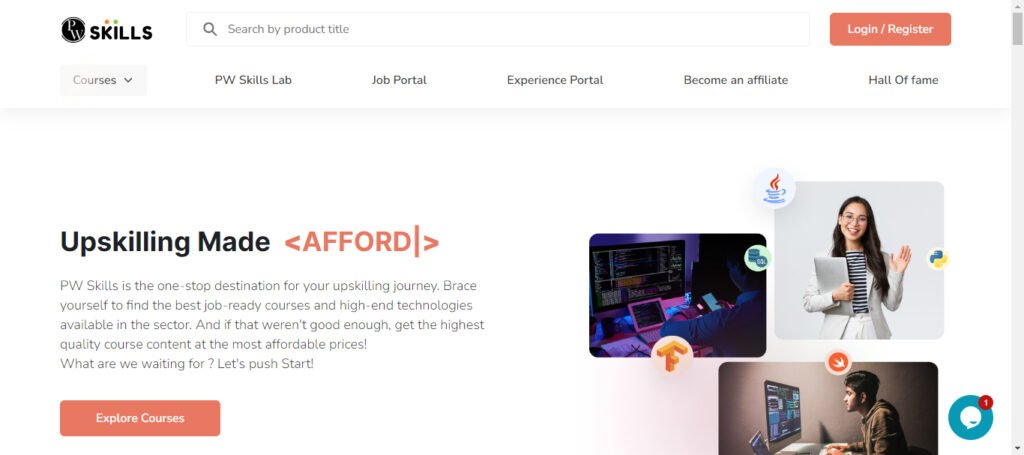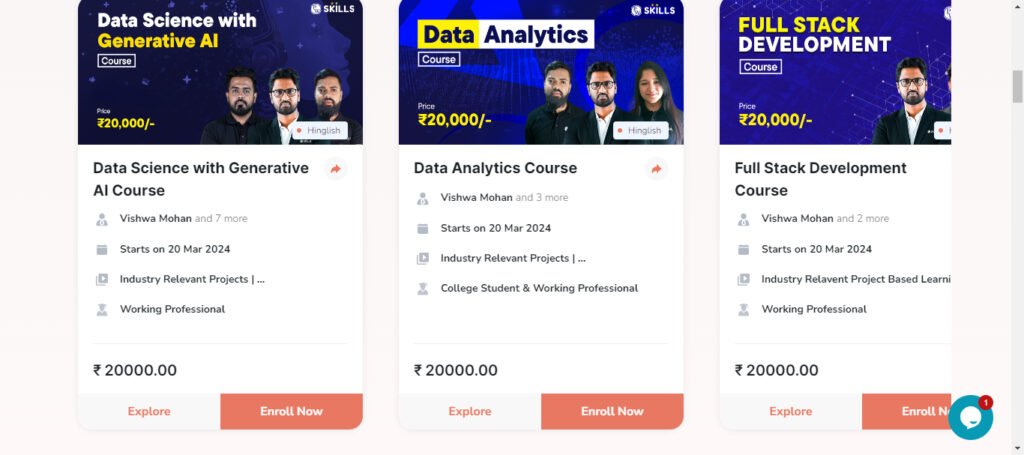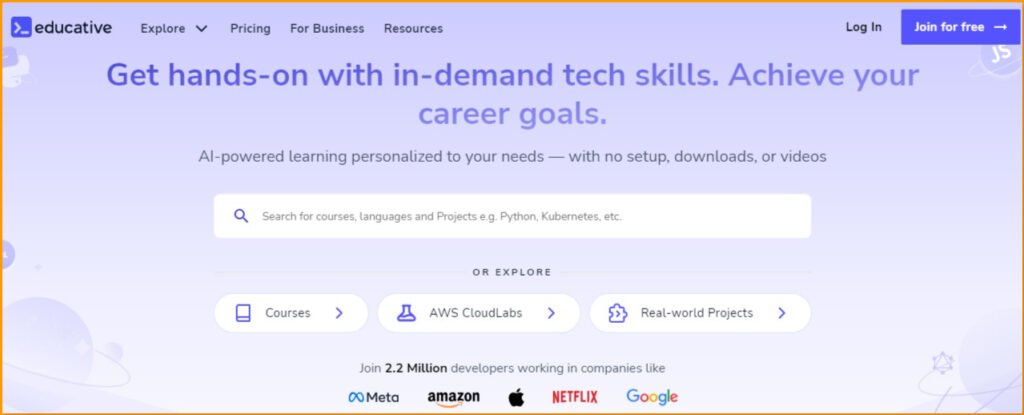PW Skills Review 2024: Do PW Skills Provide Placement?
- Author: Eduklass
- Updated: March 14, 2024

In a fast-paced world where adaptability and proficiency are keys to success, the evaluation and enhancement of personal and workplace (PW) skills have become paramount.
This review delves into the significance of PW skills, strategies for assessment and improvement, their application in various spheres, and the evolving landscape in the digital age.
What are PW Skills?
PW skills encompass a broad spectrum of competencies essential for effective functioning in both personal and professional settings.
These skills include communication, teamwork, leadership, adaptability, and problem-solving. They are not only crucial for job performance but also for fostering healthy relationships and personal growth.
Understanding the nuances of PW skills involves recognizing their significance in navigating complex challenges, fostering collaboration, and achieving individual and organizational goals.
Why Choose PW Skills to Learn Coding?
Are you thinking about learning how to code but feeling overwhelmed by the options out there? Let me tell you why PW Skills might just be the perfect choice for you.

First off, let’s talk about simplicity. PW Skills offers coding courses that are designed to be easy to understand, even if you’re brand new to programming. They break down complex concepts into bite-sized lessons, making it easier for you to grasp the fundamentals without feeling lost.
Another reason to choose PW Skills is the support they provide. Learning how to code can be challenging at times, but with PW Skills, you’re never alone.
Their team of experienced instructors is always there to answer your questions, provide guidance, and offer encouragement every step of the way.
But perhaps the most compelling reason to choose PW Skills is their practical approach to coding. Instead of just teaching you theory, they focus on real-world applications.
You’ll learn by doing, working on projects that simulate the kinds of challenges you’ll face in the field.
And let’s not forget about flexibility. With PW Skills, you can learn coding at your own pace, on your own schedule. Whether you’re a full-time student, a working professional, or a busy parent, PW Skills makes it easy to fit coding into your life.
So why choose PW Skills to learn coding? Because they make it simple, provide excellent support, focus on practical skills, and offer the flexibility you need to succeed. With PW Skills, you’ll not only learn how to code – you’ll thrive in the world of programming.
PW Skills Fees and Pricing Structure

1. Factors Influencing PW Skills Fees:
- Experience and Expertise: The depth of experience and expertise a professional writer brings to the table directly impacts their fees. Writers with a proven track record of delivering high-quality content often command higher rates due to their proficiency and reliability.
- Content Type and Complexity: Different types of content require varying levels of research, creativity, and technical expertise. Writing a blog post might have a different fee structure compared to crafting technical documentation or copywriting for advertisements. The complexity of the content significantly influences pricing.
- Word Count and Scope: The length and scope of the project play a pivotal role in determining fees. While some projects might be short and concise, others could demand extensive research and drafting, which translates into higher fees.
- Timeline and Urgency: Tight deadlines and urgent projects often necessitate dedicated effort and attention from the writer. In such cases, writers might charge a premium for expedited delivery or short turnaround times.
- Niche Specialization: Writers with specialized knowledge or expertise in niche industries or subjects often charge higher fees due to the added value they bring to the table. Specialized content requires a deeper understanding and insight, which is reflected in the pricing structure.
2. Common Pricing Models in PW Skills:
- Per Word: One of the most prevalent pricing models in professional writing is charging per word. Writers determine a fixed rate for each word they write, which provides clarity and transparency for both parties involved.
- Per Hour: Some writers prefer to charge based on the number of hours dedicated to a project. This model accounts for the time spent on research, drafting, revisions, and client communication. Hourly rates vary depending on the writer’s experience and market demand.
- Project-Based: For larger projects or ongoing assignments, writers often negotiate project-based fees. These fees are determined after assessing the scope, complexity, and deliverables of the project. Project-based pricing offers flexibility and ensures that writers are adequately compensated for their efforts.
- Retainer Agreements: Establishing retainer agreements with clients involves a long-term commitment where the client retains the services of the writer for a specified period. Retainer agreements provide writers with a stable income stream and clients with priority access to their services.
3. Setting Competitive Rates:
- Market Research: Conducting thorough market research is essential to gauge prevailing rates and industry standards. Understanding what competitors charge for similar services helps writers position themselves competitively in the market.
- Value Proposition: Writers should articulate their unique value proposition to clients, highlighting their expertise, reliability, and commitment to delivering exceptional content. Emphasizing the quality and efficacy of their services justifies higher rates and fosters long-term client relationships.
- Negotiation Skills: Effective negotiation skills are indispensable when discussing fees and pricing with clients. Writers should be prepared to justify their rates based on the value they offer and be open to flexible arrangements that benefit both parties.
PW Skills Assessment Methods
Assessing PW skills requires employing various methods to evaluate strengths, weaknesses, and areas for improvement. Self-assessment involves introspection and reflection on one’s abilities and performance.
Peer assessment allows for feedback from colleagues or peers, providing diverse perspectives and insights.
Professional assessment involves feedback from supervisors or mentors, offering valuable guidance for skill enhancement.
Each assessment method contributes to a comprehensive understanding of PW skills, enabling individuals to identify areas of focus and development.
Developing PW Skills
Developing PW skills is a continuous process that involves intentional effort and practice.
It requires individuals to engage in activities that enhance their abilities, such as effective communication, problem-solving, and time management.
By seeking opportunities for growth, embracing challenges, and leveraging feedback, individuals can cultivate and refine their PW skills to achieve optimal performance and success in various endeavors.
PW Skills Enhancement Strategies
Enhancing PW skills entails adopting strategies that facilitate continuous improvement and growth.
Effective time management techniques enable individuals to prioritize tasks, allocate resources efficiently, and optimize productivity.
Clear and concise communication fosters understanding, collaboration, and synergy within teams and organizations.
Stress management practices help individuals cope with pressure, maintain resilience, and sustain performance in challenging environments.
Applications of PW Skills
PW skills find diverse applications in professional environments, interpersonal relationships, and personal endeavors. Effective communication facilitates the exchange of ideas, fosters mutual understanding, and resolves conflicts constructively.
Problem-solving skills enable individuals to identify challenges, analyze situations, and devise innovative solutions to complex problems. Teamwork promotes synergy, cooperation, and collective achievement, driving success in collaborative endeavors.
PW Skills and Career Success
The mastery of PW skills is instrumental in driving career success and advancement.
Employers value individuals who demonstrate strong communication, leadership, and problem-solving abilities as they contribute to organizational effectiveness and productivity.
PW skills enhance job performance, promote professional growth, and increase employability in competitive job markets, positioning individuals for career progression and success.
Challenges in Developing PW Skills
Developing PW skills is not without its challenges, as individuals may encounter obstacles such as procrastination, perfectionism, and distractions.
Overcoming these challenges requires self-awareness, resilience, and commitment to personal growth.
By adopting strategies to manage time effectively, maintain focus, and overcome self-imposed barriers, individuals can navigate challenges and cultivate the skills necessary for success.
Tools and Technologies for PW Skills Improvement
Advancements in technology offer a myriad of tools and resources for PW skills improvement. Productivity apps enable individuals to organize tasks, track progress, and manage time efficiently.
Online courses and tutorials provide accessible and flexible learning opportunities, allowing individuals to acquire new skills and knowledge at their own pace.
Mentorship programs offer guidance, support, and valuable insights from experienced professionals, facilitating skill development and career advancement.
PW Skills in the Digital Age
In the digital age, PW skills are indispensable for navigating remote work environments, virtual collaborations, and technological advancements.
Adaptability and proficiency in digital tools and platforms are essential for effective communication, collaboration, and productivity.
Embracing technology-enabled solutions, fostering virtual teamwork, and leveraging digital resources empower individuals to thrive in dynamic and evolving work environments.
Case Studies: PW Skills in Action
Examining real-life scenarios where PW skills have been instrumental provides valuable insights and inspiration for individuals seeking to enhance their skills.
Success stories highlight the impact of effective communication, problem-solving, and teamwork in achieving organizational objectives and personal goals.
By analyzing case studies, individuals can glean practical strategies, lessons learned, and best practices for PW skills development and application.
Future Trends in PW Skills Development
As technology continues to evolve, the landscape of PW skills development is undergoing transformation.
Automation and artificial intelligence (AI) are reshaping traditional skill requirements, emphasizing the importance of adaptability, creativity, and critical thinking.
The future of PW skills development lies in embracing emerging technologies, fostering digital literacy, and cultivating a mindset of continuous learning and innovation.
Conclusion
In conclusion, PW skills serve as the cornerstone of personal and professional success in today’s dynamic and interconnected world.
By prioritizing self-improvement, embracing challenges, and leveraging available resources, individuals can cultivate the skills necessary to thrive in diverse environments and achieve their fullest potential.
Frequently Asked Questions
Is PW skills free?
No, PW Skills isn’t free. They usually charge for their courses and services.
Does PW skills provide placement?
Yes, PW Skills does provide placement assistance to its students. They help in connecting students with job opportunities after completing their courses.
Is PW skills good for coding?
Yes, PW Skills is considered good for coding. They offer various coding courses and resources to help individuals learn and improve their coding skills.



